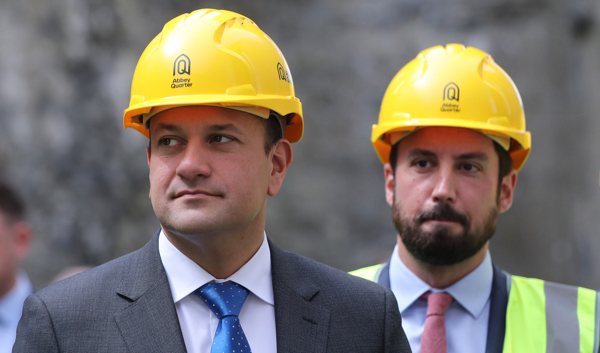So it's all the fault of the Irish. Boris Johnson's Brexit strategy is becoming clearer, and this is the key to it. It is not a strategy to deliver a good outcome by solving some of the political difficulties. There is still no sign he has any of the answers to those. It's a strategy to name and blame a scapegoat for his forthcoming failure.
The Government of the Irish Republic, the Johnson camp is starting to say, is stubbornly and maliciously refusing to drop its insistence on the notorious Irish backstop in the withdrawal agreement negotiated by Theresa May. So if and when the United Kingdom crashes out of the European Union on October, with untold damaging consequences for both Britain and Ireland, it will not be Boris Johnson's fault. It's all down to that upstart "pipsqueak" Leo Varadkar, as one English newspaper columnist described the Taoiseach (Prime Minister).
Elements of the Tory-supporting Press, dancing to the tune apparently emanating from Conservative Central Office, have started a campaign to denigrate and undermine him. The plan, we may suppose, is not actually to force him to back down over the backstop, but to establish in the British public's mind the idea that Mr Johnson's perfectly reasonable demands are being frustrated by Irish obstinacy and stupidity.
In fact Mr Varadkar has shifted not one millimetre from the position that Dublin and Brussels have insisted upon from the start. They are determined that after Brexit there shall be no physical or visible border between Northern Ireland and the Republic, just as there has been no border between the United Kingdom and the Republic as long as both belonged to the European Union. Britain's departure from the EU is designed, among other things, to give it the freedom to negotiate new trade deals with other countries, which may have different regulatory standards and different customs tariffs. That means that goods crossing the border in either direction have to be checked, and turned back if they do not comply with regulations and/or charged customs fees if any are due.
Mrs May's final solution, proposed by her and accepted by the EU, was that the UK and Ireland would remain inside the EU common customs area, the Customs Union, so that tariffs on exports and imports would be eliminated; and manufacturing standards, for instance relating to health and safety, would remain the same on both sides of the border. This "backstop" situation would last until a new agreement had been reached to govern trade between the UK and EU, at which point it would lapse.
The point about the backstop is that it is logically necessary – it is not some inconvenience dreamt up in Dublin to spite the British, perhaps in revenge for historic grievances. There are two ideas in circulation that would make it unnecessary if they led to a workable alternative. The first would be the electronic monitoring of goods to log them as they leave their point of departure or arrive at their destination rather than as they cross the actual border. It would become a virtual border.
The problem is that no such system at present exists and the possible complications are immense. The Johnson plan, it appears, is to minimise these difficulties so that the absence of such a system is solely due to the wilful obstruction of the Irish Government.
There is a second way forward, which Mr Johnson may or may not be holding in reserve. That would be to reinstate the Theresa May withdrawal agreement concerning the Irish border as it existed before the Democratic Unionist Party exercised its veto. She had to give way because her Government depended in the DUP's support for its Parliamentary majority. But the initial plan, agreeable to the EU and the UK at that point, was to move the border into the Irish Sea. Both parts of Ireland would remain inside the EU Customs Union and the Single Market, while the rest of the United Kingdom would leave both. Goods entering the British mainland from either part of Ireland would be liable to customs checks at their port of arrival.
The DUP's objection is that this would make the island of Ireland even more a single economic unit than it is now, and hence could advance the case for eventual Irish unity. But arguably it could have the opposite effect, making Irish unity less necessary. Indeed, in so far as there is a culprit somewhere in Ireland for Boris Johnson's problems with Brexit, that would more likely be the DUP and its neurotic sensitivity to anything that it deems a threat to its "British" identity. Maybe, when the preposterous campaign to blame Mr Varadkar doesn't seem to be working, he will start looking elsewhere.



 Loading ...
Loading ...
What do you think?
You can post as a subscriber user ...
User comments (0)